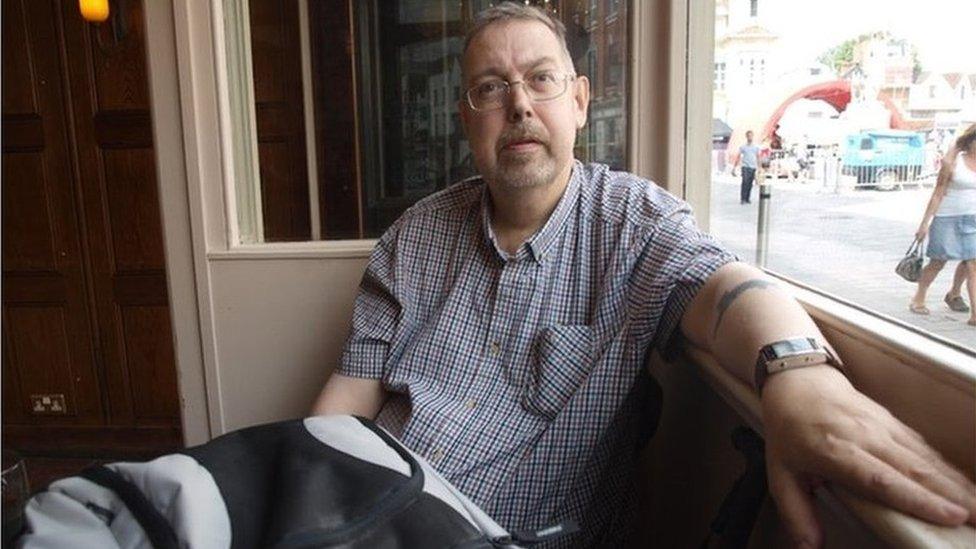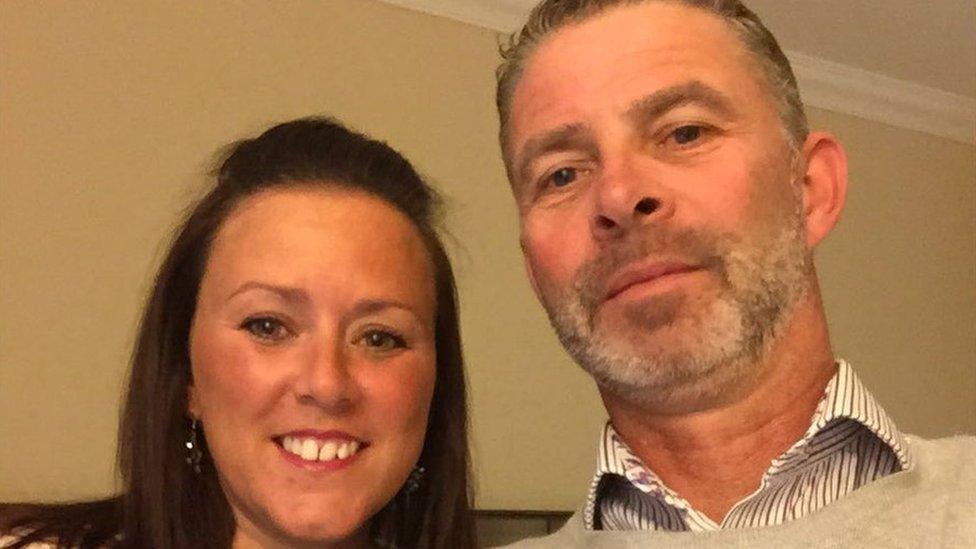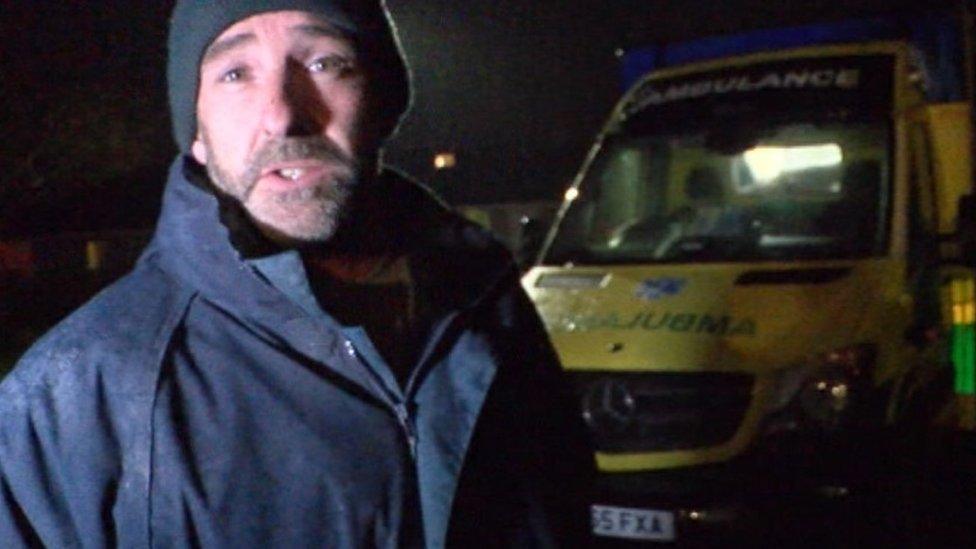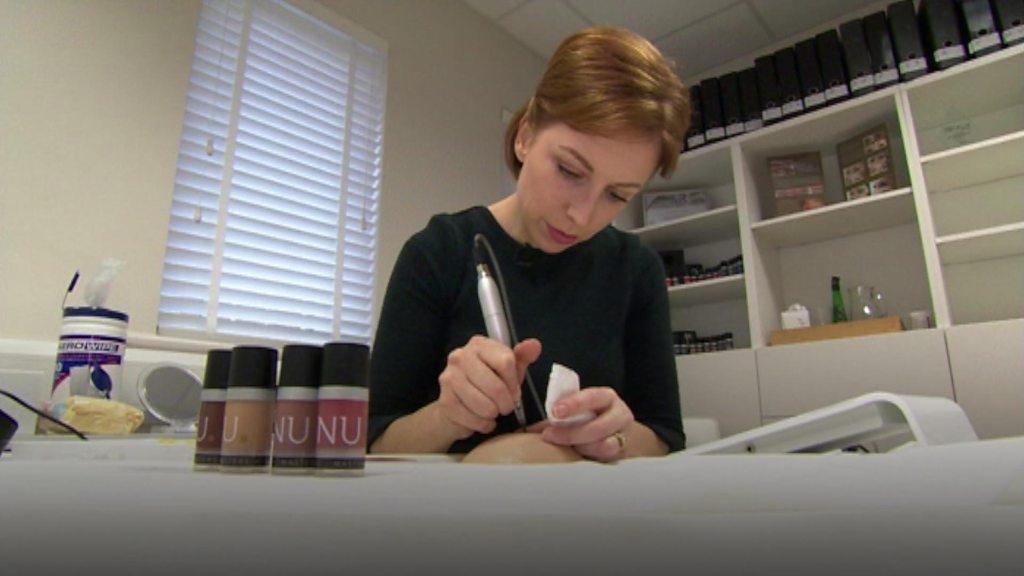NHS Health Check: 'How NHS changed our lives'
- Published
The NHS has come under intense pressure this winter, with record numbers of patients facing long waits in accident and emergency units among other challenges.
We asked some of those who have fallen ill, and the families of others, to share their experiences of winter 2016-17.
Sue's father's life changed dramatically after he fell out of bed while in hospital in December 2016.
Bryan, 84, had been admitted to hospital near their house in Cornwall for a hip operation.
Sue says she was not told about his fall for several days, eventually she was told he would not walk again and possibly had only six months left to live.
"I am devastated - six weeks ago everything was fine, now this is not the world I imagined I'd be in.
"In December he was walking into town, doing gardening, he loved mechanics and tinkering.
"Now in hospital his mental health has really deteriorated, he does not speak and strips naked in public.
"I blame the trauma of the fall and the time he's been forced to spend in hospital.
"I'm really on edge, I feel like I'm about to fall off a cliff.
"I break down in tears at least once a day.
"He's had his life taken away too soon.
"Are we saying that because he's too complicated, our society can't care for him?
"It seems like such a big fight to just find out from the hospital what is going on.
"I just hope to God that he doesn't understand what is happening to him.
"I feel like he'll never come home again, he seems lost to us."

John Perrins was on the M6 motorway, driving home from Cambridge, when he realised he was having a heart attack.
An ambulance driver himself, he had feared he would never see his wife again - so intense was the pain. But a paramedic saved his life at the side of the road.
"I was vomiting and felt like a horse was kicking me in the chest.
"My wife called an ambulance, which arrived within 10 minutes - seeing the blue lights was the most wonderful thing I've ever seen.
"I passed out, but apparently they performed three lots of heart massage - 90 compressions.
"When I came round they spoke to me and, although I was scared, the way that the paramedic spoke to me made me feel safe.
"The ambulance crew were absolutely phenomenal.
"A friend who is a paramedic came to see me and he told me that the last six heart attack patients he worked on had died - I felt so lucky that I had this particular ambulance crew.
"They have given me my life back.
"The paramedic was treating me, teaching a trainee and looking after my wife in the ambulance - I could not have asked for a better person.
"I am trying to find out the names of the ambulance crew - I want to find them so I can say thank you."


Trevor, 58, says that the NHS has treated his diabetes and depression "brilliantly"
Trevor Dallimore-Wright says his local GP and hospital are "like a family" to him, regularly providing life-saving care for his complex health conditions.
"The NHS has been absolutely brilliant," says Trevor, from London, who has diabetes and depression.
"My GP keeps me sane and out of hospital - I would give her 10 out of 10.
"I've had emergency admittance twice recently with sepsis - I went to A&E and was treated very quickly.
"They've had a great impact on my life.
"NHS treatment has helped me during the times that I could not get out of bed.
"My GP is extremely kind and patient. They are so patient-centred, I would put them in the luxury bracket.
"All the hospital staff are extraordinarily friendly.
"They are there despite the infrastructure problems in the NHS, and the care could not be better.
"From the moment I walk in, I know I'm being looked after.
"My only problem is that the NHS won't pay for immunotherapy drugs which are at the front line of treatment but are expensive."


Nikki, 36, had her scheduled operation cancelled twice and she is still waiting
Thirty six-year-old Nikki Alldis' satisfaction levels are at the other end of the spectrum, however, despite also living London. She says she has waited 15 months for a bowel operation, which has been twice cancelled.
When the procedure was scheduled for early January, she mentally prepared her young children and rearranged her work. But Nikki has twice received a last-minute call telling her there is no bed space.
She is still waiting.
"I'd prepared mentally - I planned my whole Christmas around the operation and recovery. I prepared frozen dinners for my kids, they are seven and 13, and I said a farewell goodbye.
"Then in the morning the nurse called me and said, 'We have no bed for you.'
"I was gutted. The kids were so confused when they came home and I was still there.
"I've been waiting for 15 months now - it's hanging over me.
"I did not believe the second appointment would happen, but I packed my bags anyway.
"We didn't even bother to rearrange my husband's work that time, if he's not working we're not earning, so we can't afford these cancellations.
"I put things in place with my work for people to cover me.
"I'm still waiting, hopefully it's third time lucky."

Bipolar treatment
When 29-year-old Paul was feeling suicidal in January, the NHS crisis care team in west London gave him 24-hour care to keep him safe.
He has received treatment for bipolar disorder for four years and says his consultant and crisis team are outstanding.
"They helped me in my darkest and most depressive hours," says Paul, who asked for his surname not to be revealed.
"I came back home after New Year and went back to day-to-day life, but it kicked off a hefty depression and I was left feeling really low and suicidal.
"My partner called the crisis team, and they came to our house three or four times a day.
"They come at 02:00 or 03:00, they are really responsive.
"I don't feel like they are just doing their jobs, they have genuine care for me.
"They take away my medication to make sure I will not overdose and when they visit, they make me take the medication.
"Sometimes they just spend time with me.
"They ask how I am, what did you eat and sometimes they make me do things like go and buy some milk, which I don't always feel able to do.
"I would not be alive without them.
"But one problem I have with NHS mental health care is that they medicate but do not do counselling, there is a massive waiting list, so now I have to get counselling privately."

"Before she was diagnosed with cancer, my mum could run a marathon," says Richard Taylor, 55 from Liverpool.
He was devastated after watching her "undignified" death last month.
The local cancer centre did not have the capacity to give her end-of-life care.
"After she received the second diagnosis, she was sent home and we got caught in a communication loop between three hospitals. It was an emotional rollercoaster.
"Eventually I had to take her to A&E - she could not eat or drink.
"She spent 13 hours on a trolley, behind a curtain in a noisy and busy ward.
"I stayed on a chair beside her and slept on the floor - she died a week later.
"My gripe is with the lack of communication and the delays in my mum's treatment.
"The nursing staff were fantastic, but there is only so much they can do - they could not give my mum 24-hour attention.
"She was a very proud and dignified woman - but in the end she was simply scared to be alone.
"It was awful watching someone die in this extremely undignified way.
"If she was an animal, they would have put her down - she was starving and dehydrated.
"The nurses were lovely and compassionate, but they offered me no support.
"The NHS is a great thing, but it is under the hammer."

NHS Health Check

A week of coverage by BBC News examining the state of the NHS across the UK as it comes under intense pressure during its busiest time of the year.

By Georgina Rannard, UGC & Social News
- Published1 February 2017

- Published31 January 2017

- Published18 January 2017